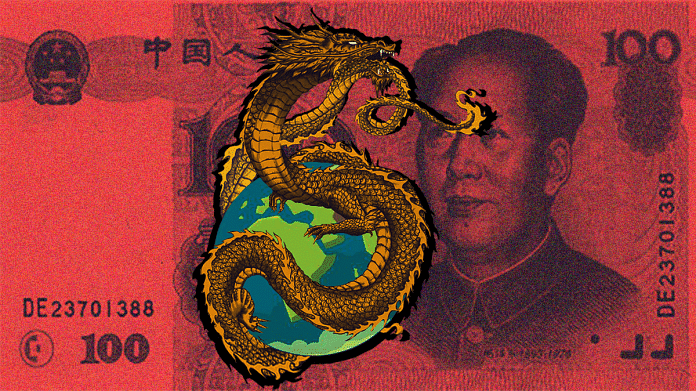Its long record of stealing technology from western companies is now resulting in defensive action by some countries.
Are Chinese expansionism and aggressiveness, noticeably ramped up in recent years, beginning to cost the country? So it would seem. For many years Beijing had got away with combining technology theft with a mercantilist trade and currency policy, following it up with a new assertiveness in foreign policy. That period as a free-rider has ended with Donald Trump’s frontal tariff assault on Chinese exports to the US. The US too will hurt as American consumers pay higher prices, but some producing units may move out of China. The yuan this year has fallen more than many Asian currencies.
 Meanwhile, the Belt and Road business is either taking a toll on, or coming unstuck in, country after country. Sri Lanka being forced to cede a port for 99 years, and give China a chunk of its Colombo sea front, is well known. Malaysia, after a change of government, has cancelled a railway line and a gas pipeline, and called a halt to a township to be built on three artificial islands; the project was being marketed to wealthy Chinese. Even Pakistan, the all-weather friend, has seen domestic criticism of the terms of some of the contracts (most of the terms remain secret). Under its new government, the country is pruning the number of projects and possibly seeking to re-negotiate some of them. A fourth country that has seen a change of government, the Maldives, could well see something similar happen there. Far from being a mark of triumphant expansionism across Asia, the Belt and Road Initiative has become a source of discord.
Meanwhile, the Belt and Road business is either taking a toll on, or coming unstuck in, country after country. Sri Lanka being forced to cede a port for 99 years, and give China a chunk of its Colombo sea front, is well known. Malaysia, after a change of government, has cancelled a railway line and a gas pipeline, and called a halt to a township to be built on three artificial islands; the project was being marketed to wealthy Chinese. Even Pakistan, the all-weather friend, has seen domestic criticism of the terms of some of the contracts (most of the terms remain secret). Under its new government, the country is pruning the number of projects and possibly seeking to re-negotiate some of them. A fourth country that has seen a change of government, the Maldives, could well see something similar happen there. Far from being a mark of triumphant expansionism across Asia, the Belt and Road Initiative has become a source of discord.
Also read: As US and China battle it out, India stands to gain
It is telling that re-assessments of Belt and Road projects follow changes of government — which Beijing can’t control. But it can engineer political changes that nullify election results, as the latest developments in Sri Lanka suggest. The larger issue in countries like Malaysia, Sri Lanka, the Maldives and some in Africa is how much local political elites were compromised when signing on to dodgy or unviable projects. Re-negotiating contracts now may stoke further disputes and prove to be costly, because Beijing has so far insisted on the letter of the contract when it comes to cancellation.
Meanwhile, China faces a blowback on the technology front. Its long record of stealing technology from western companies and hacking into secure networks, combined with the suspicion that there are bugs hidden in Chinese telecom software, is now resulting in defensive action by some countries. Germany has begun blocking Chinese buying high-end engineering companies, joining the US and Canada in similar drives. Western governments are wary of Chinese ambitions for leadership in the fourth industrial revolution. Germany’s chancellor, Angela Merkel, has suggested a Europe-wide move on the issue. Australia recently barred two Chinese companies, Huawei and ZTE, from providing the technology for 5G communications networks, citing security. Earlier, the US blocked the sale of Huawei phones and stopped ZTE from using US-made components in its phones.
Some countries in the region are re-visiting their basic stance towards Beijing. After Chinese fishing vessels showed up in Indonesian waters, causing several face-offs, Jakarta warmed to New Delhi and signed up to give Indian naval ships access to Sabang port near the Malacca Straits. In Australia there is a noticeable cooling off in the government and media when it comes to attitudes to China. Canberra changed its laws last year after it discovered that generous local Chinese donors to political parties were linked to the Chinese government. There is worry that at least some Australian universities have become so dependent on Chinese students that they would not be viable without them. Hence Canberra’s active policy of wooing students from India, as a balancing factor.
Also read: India may raise duties on aluminium imports as US-China trade war sparks dumping fear
Meanwhile, Trump’s tariffs will hurt the US as much as China. Businessmen in most countries fear losses in the Chinese market if their governments become hostile to Beijing. Indeed, the prospect of a US slowdown, perhaps even a recession down the road as interest rates climb, may well end up blunting Trump’s offensive. Beijing may yet have the last laugh.




The Chinese are a wise and pragmatic people. They have arrived, in considerable style. It would be in their own interests to inject an element of moderation and reciprocity in their dealings with the world. Not just with the superpower, but especially with smaller neighbours with whom they have spun a web of shared prosperity. 50% of the world’s manufacturing is accounted for by supply chains that centre around China, Reasonable people are talking about the inevitability of conflict between America and China. Not an outcome that would be good for anyone, including India.